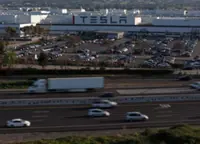An autonomous robotaxi equipped with Baidu Inc.'s Apollo autonomous driving platform travels along a road in Beijing, China, on Nov 10, 2022. Baidu's Apollo program, which allows customers to hail and ride a fully autonomous robotaxi, has racked up more than 1.4 million public journeys, and is expanding a network that already covers dozens of square miles across 10 key cities that also include Wuhan and Chongqing. — Bloomberg
Across a sprawl of streets in southern Beijing, China’s answer to search engine giant Google is charting the path for driverless cars in the world’s biggest electric vehicle market.
Baidu Inc’s Apollo program, which allows customers to hail and ride a fully autonomous robotaxi, has racked up more than 1.4 million public journeys, and is expanding a network that already covers dozens of square miles across 10 key cities that also include Wuhan and Chongqing. By next year, the company wants to have the largest autonomous service area in the world – an ambitious target considering it needs to complete with General Motors Co’s fast-expanding robotaxi unit Cruise and California-based Waymo. Baidu is also being challenged in China by competitors like WeRide and Pony.ai.





